

Work-related stress can be unavoidable due to the demands of the contemporary work environment. Work stress can cause negative impacts on individuals such as damaging an employee’s productivity and health (Schmitz, 2012).
Read more to identify the causes, signs and symptoms of work stress and learn on how to treat and cope with it.
References
Schmitz, A. (2012). Sources of stress. Human Relations. Retrieved from saylordotorg.github.io/text_human-relations/s07-03-sources-of-stress.html
Zimbardo, P. G., Johnson, R. L., & McCann, V. (2018). Psychology: Core concepts. (8th ed.).
Causes of Workplace Stress. Workplace Stressors. Sources of Stress. Work Stress As we have studied so far in this chapter, we can experience a number of possible stressors.
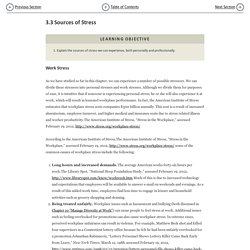
We can divide these stressors into personal stresses and work stresses. Although we divide them for purposes of ease, it is intuitive that if someone is experiencing personal stress, he or she will also experience it at work, which will result in lessened workplace performance. In fact, the American Institute of Stress estimates that workplace stress costs companies $300 billion annually. This cost is a result of increased absenteeism, employee turnover, and higher medical and insurance costs due to stress related illness and worker productivity.
According to the American Institute of Stress, some of the common causes of workplace stress include the following: Long hours and increased demands. Top 5 Triggers for Stress in the Workplace. Symptoms of Work Stress. Physical, Psychological and Behavioural Symptoms. Occupational Burnout: When Work Becomes Overwhelming. Coping one day and crying the next: Work-related burnout is real. SINGAPORE: One day at work, Ms Jamuna Raj was striking off “to-dos” from a neat hand-written list, thinking she had a lid on all her tasks at work.
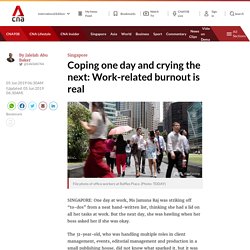
But the next day, she was bawling when her boss asked her if she was okay. The 31-year-old, who was handling multiple roles in client management, events, editorial management and production in a small publishing house, did not know what sparked it, but it was the start of her journey towards realising that she was experiencing burnout. “I was striking the to-dos off, but for every one that I did, there were five more. Still, because I was striking things out, I thought I could handle it,” she told CNA. At the time, she had multiple deadlines looming ahead of her. Her boss had checked on her because she had changed and her colleagues noticed it, said Ms Jamuna, a Singaporean who lives in Melbourne. “As soon as he (her boss) asked me that, I started bawling. READ: Commentary: What’s behind burnout? Stress Management. 9 Simple Ways to Deal With Stress at Work. According to research, the percentage of Americans who are stressed at work is high, and it’s only getting higher.
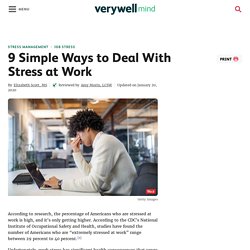
According to the CDC’s National Institute of Occupational Safety and Health, studies have found the number of Americans who are “extremely stressed at work” range between 29 percent to 40 percent.1 Unfortunately, work stress has significant health consequences that range from the relatively benign—more colds and flu—to the more serious, like heart disease and metabolic syndrome.2 But, because stress at work is so common, finding a low-stress job may be difficult or impossible for many people. A more realistic choice would be to simply adopt more effective strategies to reduce stress at work. Here are some stress management techniques to try. Start Your Day off Right Be Clear on Requirements A factor that contributes to job burnout is unclear requirements. Stay Away From Conflict Stay Organized Be Comfortable Another surprising stressor at work is physical discomfort.
How Can Management Help Employees? The Workplace Stress Solution. Journal Article - Work Stress Prevention Needs of Employees and Supervisors. Journal Article - Perceptions of Work Stress Causes and Effective Interventions in Employees Working in Public, Private and Non-governmental Organisations: A Qualitative Study. Case Studies on Work-related Stress. Workplace stress – an occupational health case study. This case study on workplace stress shows how the evidence base for occupational health underpinned a successful intervention.
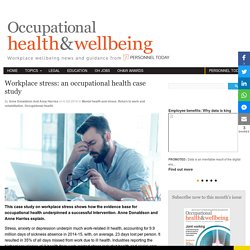
Anne Donaldson and Anne Harriss explain. Worksite Mental Health Application Among Japanese Company. Workplace Interventions Can Reduce Stress and Burnout. A new report from researchers at Leeds Beckett University reviews the most effective ways to treat and prevent burnout and work-related stress, and revealed organizational interventions in the workplace may be more effective than individual interventions alone.
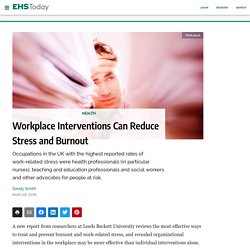
The report, “Interventions to Reduce Burnout in High-Risk Individuals: Evidence Review,” was commissioned by Public Health England and prepared by the Centre for Health Promotion Research at Leeds Beckett. It provides an overview of how individual and workplace interventions can prevent burnout and work-related stress. “This evidence review highlights workplaces as a key setting for improving people’s mental and physical health, as well as their overall wellbeing,” says Dr.
Justin Varney, interim deputy director for Health & Wellbeing (Healthy People), Public Health England. “Having a healthy workforce can reduce sickness absence, lower staff turnover and boost productivity. Quiz: Are You Too Stressed Out at Work? Credit: bleakstar/Shutterstock Stress can come from many different aspects of your life, and a little stress now and then is totally normal.
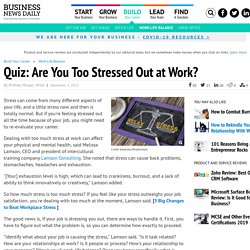
But if you're feeling stressed out all the time because of your job, you might need to re-evaluate your career. Burnout Self-Test. © iStockphotoAVTG Are you at risk of burning out?
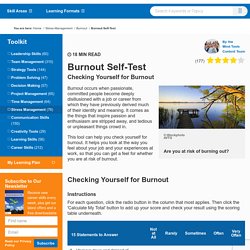
Burnout occurs when passionate, committed people become deeply disillusioned with a job or career from which they have previously derived much of their identity and meaning. It comes as the things that inspire passion and enthusiasm are stripped away, and tedious or unpleasant things crowd in. This tool can help you check yourself for burnout. It helps you look at the way you feel about your job and your experiences at work, so that you can get a feel for whether you are at risk of burnout. Checking Yourself for Burnout Instructions For each question, click the radio button in the column that most applies.
Your last quiz results are shown. You last completed this quiz on , at .